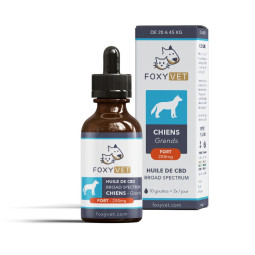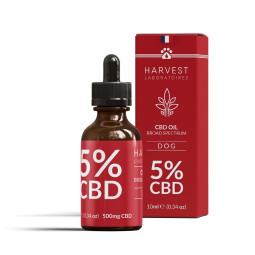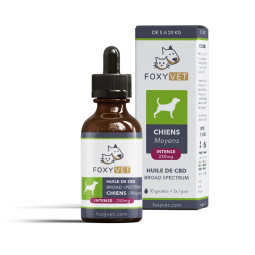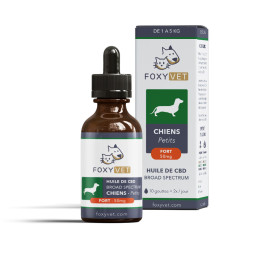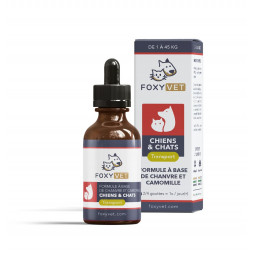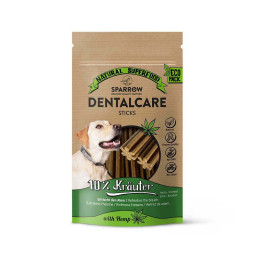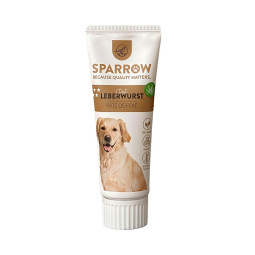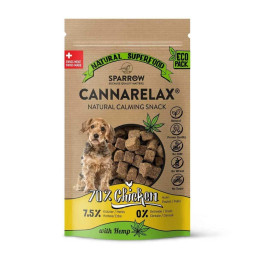Cannabidiol, or CBD, is a valuable resource for improving the comfort and well-being of our four-legged friends. well-being of our four-legged friends. Used to manage stress, pain and various behavioral disorders in dogs, CBD is a natural solution that is gaining in popularity. In its oil form, it's easy to administer and tailored to the specific needs of each animal. Discover how this molecule can help your canine companion live a more peaceful and healthy life.
CBD: a natural solution for dogs
CBD is a component of hemp, known for its many therapeutic properties. It is increasingly used to improve the well-being of dogs and help them cope with various health problems. The benefits of CBD for our canine companions are many and varied:
- It helps reduce stress and anxiety, especially during stressful situations such as fireworks, changes in environment or visits to the vet.
- It relieves chronic pain, particularly that associated with osteoarthritis.
- It can be used to manage behavioral disorders such as aggression or compulsions.
- It stimulates appetite, which can be beneficial for dogs suffering from loss of appetite.
- It promotes better sleep.
It is essential to note that each dog may react differently to CBD. It is therefore recommended to start with a low dose and adjust according to the animal's response.
What is Cannabidiol?
Cannabidiol, more commonly known as CBD, is a molecule extracted from hemp, a variety of the cannabis plant. It is one of many cannabinoids present in these plants. It's important to note that, unlike another well-known cannabinoid, THC (tetrahydrocannabinol), CBD has no psychoactive effects. This means it doesn't induce euphoria or dependency. CBD is used for its multiple health benefits, particularly in dogs. Indeed, numerous studies have shown that CBD can help dogs relieve chronic and inflammatory pain, such as osteoarthritis, which is common in older dogs.
How does CBD affect the nervous system of animals?
The effects of CBD on anxious dogs
CBD can be a valuable aid in relieving anxiety in our canine friends. By interacting with the dog's endocannabinoid system, CBD can modulate the activity of this system and help reduce stress and anxiety. This system plays a crucial role in regulating mood and stress.
Whether it's anxiety due to a change of environment, loud noises or fear of going to the vet, CBD can help calm your dog and make him more relaxed. In some dogs, it can even help control fear-related aggressive behavior.
It is essential to note, however, that CBD is not a quick fix. It can be a valuable support, but is often most effective when used in conjunction with behavior management techniques.
CBD for stressed dogs: effectiveness and advice
When it comes to managing canine stress, CBD offers an exciting natural alternative. Its effectiveness has been confirmed by numerous owners of stressed dogs, who have observed a marked reduction in their pet's anxiety following CBD administration.
According to testimonials, CBD helps to :
- Soothing the dog in the face of generalized stress
- Helping the animal deal with specific stressful situations (storms, visits to the vet, etc.)
- Promoting self-confidence and trust in people in particularly nervous dogs
It is important to remember, however, that CBD is not a miracle solution, and that its use must be adapted to each individual case.
CBD and osteoarthritis in dogs: a solution for pain?
Osteoarthritis is a common condition in older dogs, characterized by joint degeneration leading to pain and inflammation. The use of CBD to alleviate these symptoms is the subject of much discussion.
According to several testimonials and studies, CBD seems to offer a noticeable improvement in canine osteoarthritis symptoms, including:
- Reduced joint pain
- Reduced inflammation
- Improved mobility
CBD acts by interacting with the receptors of the endocannabinoid system present in dogs, in particular CB1 and CB2 receptors. This in turn reduces pain and inflammation, making life more comfortable for our four-legged friends.
The effectiveness of CBD for aggressive dogs
Aggression can be a major problem for some dogs. A solution like CBD could help manage this behavior. CBD acts on CB1 receptors in the animal's brain, helping to reduce aggression. This action is reinforced by its relaxing and anxiolytic effects, similar to those observed in humans.
The effectiveness of CBD on aggressive dogs is not just anecdotal. Numerous observations by pet owners and animal health experts confirm these effects. For example, CBD can be particularly effective in calming dogs that become aggressive out of fear, due to a phobia or a stressful event.
However, CBD administration must be carried out with care. It's best to start with a small dose and adjust according to the animal's reaction. There are various ways of giving CBD to an aggressive dog, such as adding it to its food or using CBD oil. Although it is generally well tolerated, it is always advisable to consult a veterinarian before starting CBD treatment.
CBD products for dogs
CBD oil for dogs: dosage and side effects
The dosage of CBD oil for dogs varies according to several factors, such as the animal's size, weight and state of health. It is generally administered 2 to 3 times a day. Always start with a minimum dose and adjust according to the animal's reactions.
With regard to side effects, despite the absence of precise scientific data, certain symptoms may occur, such as dry mouth, drowsiness or digestive disorders (vomiting, diarrhoea). Elevated liver enzymes have also been observed in clinical trials. In addition, high doses of CBD may cause a temporary drop in blood pressure, resulting in a feeling of dizziness.
CBD dog treats: how to use them?
CBD dog treats are a convenient and palatable form of administering CBD to your pet. They are generally appreciated by dogs and facilitate regular CBD intake.
To use them, simply give them to your dog as a regular treat. Dosage depends on your dog's weight and the desired effect. Always start with a minimum dose and observe your pet's reactions to adjust if necessary.
CBD treats are generally slower-acting than oil, taking between 30 minutes and 1 hour to take effect. Their duration of action can vary from a few hours to several days.
There are several types of CBD dog treats such as kibbles or cookies, with different flavors (chicken, salmon, duck...) to suit your pet's preferences.
CBD dog food: advantages and disadvantages
CBD dog food offers a simple and effective way to administer CBD to your pet. They offer several advantages:
- Ease of administration: Dogs generally enjoy the taste of kibble, making CBD administration easy and stress-free.
- Precise dosing: Each kibble contains a precise amount of CBD, enabling precise, regular dosing.
- Long-lasting effects: The effect of CBD, released slowly with digestion, can last longer.
However, there are also a few disadvantages to consider:
- Action time: The effect of CBD may take some time to manifest itself, as the kibbles must be digested before the CBD is released.
- Fewer dosing options: Unlike CBD oil, it can be more difficult to adjust the dose with kibbles.
- Cost: CBD kibbles can be more expensive than other forms of CBD.
Dosage of CBD for dogs: advice and recommendations
The recommended dosage of CBD for your dog depends primarily on his weight and the intensity of his symptoms. In general, a commonly suggested dosage is 0.2 to 0.5 mg of CBD per kilogram of body weight, twice a day.
However, every dog reacts differently to CBD. It is therefore essential to start with a lower dose and gradually adjust it according to your pet's reaction.
CBD oils are available in different concentrations. For example, one drop of 3% oil corresponds on average to 1.75 mg of CBD. Puppies are generally treated with 3%.
To determine the maximum dose of CBD in dogs, some experts use a limit of 5 mg CBD/kg or 5 mg per kg.
Veterinarians' opinions on the use of CBD in dogs
Many veterinarians are positive about the use of CBD in dogs, highlighting its potential benefits for animal well-being. In particular, they recognize its proven anti-inflammatory potential, useful for treating joint pain. Some vets even go so far as to sell CBD-containing products in their clinics.
However, it's crucial to point out that CBD use should be under veterinary supervision, especially in the case of severe symptoms such as nausea or vomiting, which can be a sign of underlying medical problems.
It's also important to consult a veterinarian if your pet is following another treatment, to avoid any possible interactions. Finally, although CBD is generally well tolerated, it's always best to start with a small dose and adjust according to your pet's reaction.
Is CBD good for all dogs?
CBD for dogs suffering from epilepsy
Epilepsy in dogs can be a major source of stress for both pet and owner. Research suggests that the use of CBD may be beneficial for dogs suffering from epilepsy. In fact, CBD is thought to reduce the number of convulsive seizures, and may even help prevent seizures in dogs predisposed to epilepsy.
CBD works by interacting with the CB1 receptors present in the dog's brain, offering a degree of soothing. It's a natural alternative to the traditional drugs often prescribed for this condition. In fact, more and more vets are recommending CBD as an alternative.
However, it is essential to consult a veterinarian before starting CBD treatment for an epileptic dog. As with any new treatment, it's best to start with a minimum dose and observe the animal's reaction, adjusting the dose if necessary.
CBD for older dogs and joint pain
CBD can be a valuable ally for older dogs suffering from joint pain. Indeed, as they age, our canine friends can develop pain similar to that of human osteoarthritis. CBD offers a natural alternative to ease their daily discomfort.
CBD's anti-inflammatory and analgesic effects help reduce the inflammation and pain associated with these joint conditions. In addition, CBD oil can block several key inflammatory mediators involved in osteoarthritis and rheumatoid arthritis in dogs, helping to improve their comfort.
It's crucial to remember, however, that every dog is unique and that the response to CBD can vary from one individual to another. That's why we recommend starting with a minimum dose and gradually adjusting according to the animal's response.
Can you give CBD to a puppy?
Although CBD has proven beneficial for adult dogs, it's important to take certain precautions when it comes to puppies. Puppies' biological systems are still developing, which may make them more sensitive to the effects of CBD. In addition, the endocannabinoid system, with which CBD interacts, is not fully developed in puppies. It is therefore recommended to wait until the puppy reaches a certain age before administering CBD. However, some vets may suggest the use of very low doses of CBD for puppies in case of specific disorders. As always, be sure to consult a veterinarian before administering CBD to a puppy.
Buying CBD for dogs: selection criteria and average price
When buying CBD for your dog, there are several criteria to consider in order to make the best choice. First, the concentration of CBD: it must be adapted to your pet's weight and size. Next, the origin of the oil: give preference to products manufactured in Europe and complying with European standards. Finally, check for the presence of other cannabinoids that may have a synergistic effect with CBD.
Prices generally range from 20 to 60 euros for a 30 ml bottle. CBD treats can cost from a few euros to over 50 euros per pack. Prices depend on CBD concentration, brand, product quality and format (oil, candy, etc.).
Is it legal to give your dog CBD?
French legislation on CBD for animals
In France, legislation concerning the use of CBD for animals is still unclear and complex. Non-medical CBD is authorized for sale and consumption, however, no CBD-based treatment for dogs is currently recognized or authorized. What's more, CBD is considered an unauthorized additive in animal feed under European regulations. It is therefore essential to consult a veterinarian before administering CBD to your pet.
CBD for animals in other countries: a comparison
The legalization of CBD for animals varies greatly from country to country. In the USA, CBD derived from hemp and containing less than 0.3% THC is legal. In theEuropean Union, several countries allow CBD, but the THC concentration must be less than 0.2%. Outside these regions, Uruguay and Jamaica allow CBD oil.
- Poland and Switzerland: very liberal laws on CBD.
- Italy: THC content in CBD can be as high as 0.6%.
- Austria and Czech Republic: maximum 0.3% THC in CBD products.
It is always advisable to find out about the specific legislation of the country you are in or to which you wish to transport CBD products.
The effects of CBD on cats: comparison with dogs
CBD dosage for cats: differences and similarities with dogs
The dosage of CBD for cats and dog share similarities, but also present differences. As with dogs, the cat's weight, age, breed and state of health are factors to be taken into account when determining the appropriate dosage. However, cats have a faster metabolism than dogs, which may require dosage adjustment. In addition, cats are generally more sensitive to supplements and medications, which means they may react differently to CBD. Thus, it is generally recommended to start with a lower dose for cats and gradually adjust according to the animal's response. There are also CBD-specific products for cats, which may contain additional ingredients to enhance palatability, such as salmon oil.
CBD oil for cats: dosage and side effects
L'CBD oil for cats oil for cats is generally well tolerated, provided the correct dosage is respected. This depends on a number of factors, including the cat's weight, size and state of health. Generally speaking, we recommend starting with a low dose and gradually adjusting according to the animal's response.
Side effects may include drowsiness, itching or intestinal problems. However, they are generally benign and temporary. It is advisable to check that your cat is not allergic to CBD before starting any treatment.
Note: Don't forget to consult your veterinarian before administering CBD to your cat.
Testimonials from dog owners using CBD
Positive opinions on the use of CBD in dogs
Many dog owners testify to the beneficial effects of CBD on the health of their four-legged companions.
- Chronic pain relief: CBD is often hailed for its analgesic properties, especially for dogs suffering from osteoarthritis or other joint pain.
- Improved behavior: Some owners report a noticeable reduction in aggression and anxiety in their dogs after CBD administration.
- General well-being: Many users report an improvement in their dog's general condition, with greater appetite and activity.
It's crucial to note, however, that every dog is unique and the effectiveness of CBD can vary from one animal to another.
Negative opinions on the use of CBD in dogs
Despite the many positive testimonials, the use of CBD in dogs is not without its critics. Some dog owners report adverse effects, generally linked to poorly controlled dosing. Dry mouth is a commonly reported side effect, which can result in increased thirst in the animal.
Other dogs may experience drowsiness, particularly at high doses. It is therefore crucial to start with a low dose and gradually adjust according to the animal's response.
It should also be noted that not all CBD products are created equal. The use of poor-quality or illegal products can have harmful consequences for your pet's health. It is therefore essential to choose high-quality CBD from reliable sources.
Finally, some dogs may have an allergic reaction to CBD, although this remains fairly rare. It is therefore advisable to monitor the animal carefully after the first administration of CBD.
FAQ : Frequently asked questions about the use of CBD in dogs
Can I give my dog human CBD oil?
Usinghuman CBD oil for a dog can be problematic. This is because CBD products designed for humans may contain ingredients that are unsuitable or may be harmful to animals. For example, some human CBD products contain xylitol, an artificial sweetener that is toxic to dogs. In addition, the dosage of human CBD oil may not be suitable for your dog. Dogs generally require a lower dosage than humans. It is therefore preferable to use a CBD oil specially designed for dogs.
How many times a day can I give my dog CBD?
The frequency with which CBD is administered to a dog depends on a number of factors, including weight, health and severity of symptoms. Generally, CBD is administered on a daily basis. However, the frequency can be adjusted according to the animal's reaction to the treatment. For example, if your dog suffers from anxiety linked to certain triggers, you might choose to administer CBD only in stressful situations. Always bear in mind that the action of CBD can take from 20 to 90 minutes to manifest itself. It is strongly recommended that you consult a veterinarian to determine the most appropriate frequency of administration for your pet.
What percentage of CBD should I choose for my dog?
Deciding what percentage of CBD to give your dog depends on a number of factors, including his weight, health and the severity of his symptoms.
- For initial use, a CBD oil for dogs percentage of 2% to 3% is often recommended.
- For small dogs (2-5 Kg), the recommended dose is 1-2 drops (0.9-2.4 mg CBD as initial dose) up to 6-14 drops (8-21 mg CBD maximum).
- For a 30 kg dog, for example, a commonly recommended dosage is 2 to 3 drops of 5% oil twice a day.
Please note that THC, another component of cannabis, must remain below the 0.3% threshold in CBD oil for dogs.
It is essential to adjust the dosage according to your pet's reaction, and not to exceed the recommended maximum of 2.0 mg CBD/kg/day.
Don't hesitate to consult a veterinarian for personalized advice.


